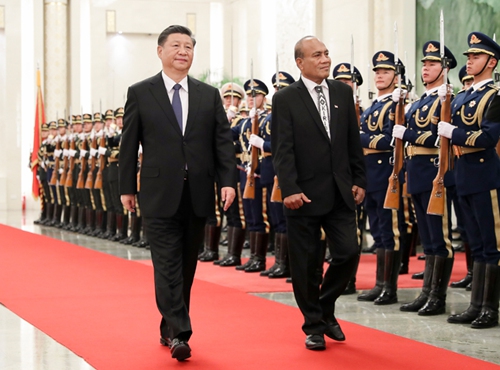China may not be very popular these days, particularly in the world’s West, but it is not to be underestimated in what kind of interesting relationships it forms with countries that could eventually further Beijing’s cause. Those partners don’t have to be large and important in nature. Quite the contrary, the poorer and more developing they are, the better and also easier for Beijing’s strategy of bringing economic progress to them.
One of these places is Kiribati. Few have even heard the name. It is a coalition of mini-islands in the midst of the Pacific Ocean, somewhere between Hawaii and New Zealand, and hardly worth mentioning, to be honest. But in a world of rising geopolitical conflicts, particularly between America and China, even the smallest jurisdictions may provide immense value to a superpower. And we all know how paranoid Washington is about China and its maritime reach beyond the South China Sea.
Why don’t I briefly correct myself on the issue of small? Kiribati may only encompass a little over 100,000 inhabitants, but taking all the islands plus their respective 200 nautical mile exclusive economic zones together, the jurisdiction covers the space of no less than the whole of India. It is not just strategically located, it also commands one of the most abundant fishing grounds on earth.
It all kind of started innocently, as these things do. Kiribati had over almost 2 decades recognised Taiwan over China under the pressure of Western powers, but Beijing played the long game, as it so often does. China built a fish plant that has been giving jobs to the scarce island population. Follow-on projects have reportedly been in the making, such as ferries, planes, and a bridge. It shouldn’t have come as a surprise that Kiribati shifted recognition back in China’s favour in 2019.
Apart from Australian and New Zealand diplomatic missions, China also established one, and the new ambassador has been hailed as a hero, as the man arrived equipped with and waving a cheque book. With the money comes dredging ships to reinforce the island’s shorelines and probably build entire islands there, much like the ones that have been used to build and fortify some of the South China Sea reefs.
Not that we haven’t seen this movie before. America, Japan, Australia, New Zealand, India, and the rest of the China-containing bunch must be shivering in their pants. It was
Reuters reporting about 10 days ago that China has drawn up plans to upgrade an old WW2-airstrip and a connecting bridge on a coral atoll-island curiously called Canton. The project had not been in the public sphere, but a Kiribati opposition lawmaker reportedly inquired whether it was part of the Belt and Road.
If the story was true and Kiribati gave the green light, it would in all likelihood provide Beijing with access to and influence over an incredibly strategic location in the Pacific Ocean and the Chinese military potentially a reach into the Pacific that is unheard of. Horror scenarios in the West have emerged, such as China reclaiming the atoll’s seabed and expanding Canton into a real island to be reckoned with, much larger than the fortified Fiery Cross Reef deep into the South China Sea.
We are obviously talking about considerable investments and construction work to sustain any kind of meaningful and longer-term deployments, and the question is how would the logistics work? With regards to the Fiery Cross Chinese dredging ships etc could be dispatched unhindered across the South China Sea. To transport such assets as far into the Pacific Ocean as Kiribati, however, would require China “breaking” the first as well as the second island chain.
To contain China’s rise and reach the Western alliance had established so-called island chains to monitor and, in case, prevent Chinese ships from crossing them into the Pacific. The first such chain runs from the southern tip of Japan across Okinawa toward Taiwan and then the Philippines. The second connects Japan with Guam and runs down south to Papua New Guinea. It will be interesting to see how Beijing would work around them.
In any case, a foray like this would be unprecedented, a geopolitical shift to be reckoned with, a testament to the fact that China will not be contained by anyone… and nice beautiful little Kiribati may find itself right in the middle of it.
